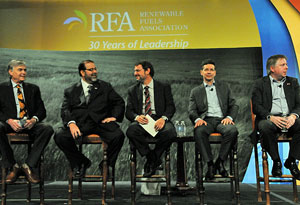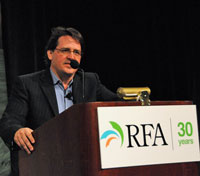 In the great tradition of saving the best for last, the 2011 National Ethanol Conference concluded with a lively panel discussion featuring global ethanol leaders.
In the great tradition of saving the best for last, the 2011 National Ethanol Conference concluded with a lively panel discussion featuring global ethanol leaders.
Those on the panel were (LtoR) George Fitch, Director of the Caribbean Basic Ethanol Producers Association; Bob Dinneen, president and CEO of the Renewable Fuels Association; Marcos Jank, president and CEO of Brazil’s UNICA; Robert Vierhout, Secretary General of ePURE, European Renewable Ethanol; and Gordon Quaiattini, president of the Canadian Renewable Fuels Association.
 Moderator Bliss Baker with the Global Renewable Fuels Alliance started the session off with a bang by asking Jank his opinion on the United States tariff on imported ethanol. “I’d like to say ‘happy 30th anniversary’ to RFA,” Jank responded, turning his attention to Dinneen on his right. “I was questioning myself, if after 30 years the industry is not now a mature industry, which means if the industry still needs subsidy or not, still needs a tariff or not.”
Moderator Bliss Baker with the Global Renewable Fuels Alliance started the session off with a bang by asking Jank his opinion on the United States tariff on imported ethanol. “I’d like to say ‘happy 30th anniversary’ to RFA,” Jank responded, turning his attention to Dinneen on his right. “I was questioning myself, if after 30 years the industry is not now a mature industry, which means if the industry still needs subsidy or not, still needs a tariff or not.”
Noting that the U.S. is now the largest ethanol producer in the world, Jank said to Dinneen, “I hope that in three years you will be a free trader as we are. It’s time to eliminate the tariff, it’s time to compete.”
The Caribbean’s Fitch challenged Jank’s position on the tariff issue and encouraged Brazil to avoid taking action against the U.S. tariff with the WTO. “The tariff is not WTO actionable,” Fitch said. “So what you’re doing is creating trade hostilities that you don’t need to create.” He suggested instead that Brazil continue marketing ethanol to the U.S. through the Caribbean Basin. “I would think that UNICA might want to use this as an initiative on their part,” he said. Brazil now can have their own Caribbean Basin Initiative to help countries not as advanced as they are … as opposed to getting into what could be a very nasty trade fight by going after the tariff.”
Dinneen pointed out that the U.S. is now shipping ethanol to Brazil because production has declined in the last year. “We ought not be trying to carve up the pie and go after each others’ industry,” said Dinneen. “The real battle here is how do we grow the international biofuels market so that we are taking more and more out of petroleum.”
Putting in his two cents, Vierhout noted that his organization in Europe is only a year old, “so if someone is entitled to duties, it is us!” However, his concern is with subsidies, not tariffs. “I don’t believe in the concept of free trade, it’s about fair trade,” he said. “So if you’re going to use national subsidies to launch your trade, we are utterly against it” adding that they would consider legal action against the blenders tax credit, or VEETC.
Unable to let that comment go, Dinneen responded that the intention of the current tax credit is for domestic ethanol use, not export and he encouraged Vierhout to do something about the European tariff schedule that encourages the import of ethanol blended gasoline. “You’re right, we need to fix that at our end, and we’re working on that,” said Vierhout.
Canada’s Quaiattini was happy to note that they have the pleasure of experiencing free trade with the United States. “We have some exports of ethanol going into the U.S. market, we have U.S. ethanol coming into the Canadian market. Under NAFTA, that is our world,” he said.
And that was just the first 15 minutes of the hour long panel! Listen to it all here – I promise you, it is entertaining. NEC Global Ethanol Outlook Panel
I also had the chance to talk with Bliss Baker to get his comments after the panel. Listen to that interview here: Bliss Baker Interview

